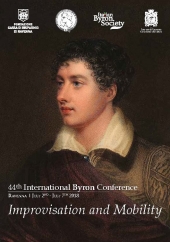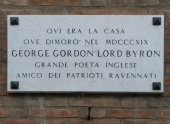14th International Student Byron Conference
20-25 May 2019
Messolonghi, Greece
Theme: “Byron and Revolution”
Keynote Speakers
Professor Roderick Beaton, King’s College London
Professor Andrew Stauffer, Virginia University USA
The Messolonghi Byron Research Center welcomes proposals for 20-minute papers to be delivered at the 14th International Student Byron Conference, to be held at Messolonghi May 20-25, 2019.
The last act of Byron’s life was to dedicate himself to the cause of the Greek Revolution, which began in 1821 and ended with the recognition of Greece as an independent state by the Great Powers in 1830. The circumstances of his death and later commemoration at Messolonghi have been much discussed ever since. But the whole of Byron’s life and career took place in the shadow of revolutions: notably the three great revolutions that together have defined the modern world: the American (1776), the French (1789) and the Industrial Revolution that was rapidly transforming Britain and Europe throughout his lifetime.
Transgressive Romanticism: Boundaries, Limits and Taboos
4-8 September 2019
University of Vechta (Germany)
Romanticism thrives on contradictions; conjuring up images and ideas of acquiescence in the sad Wordsworthian “music of humanity” (‘Tintern Abbey’) and in pastoral serenity on the one hand, it is, on the other, defined by transgressiveness, overreaching and the repudiation of boundaries. While political boundaries are often daringly crossed in Percy Bysshe Shelley’s poetry, it is intriguing to see that, aesthetically speaking, even radicals such as Shelley (persistently) abided by the strict and apparently restrictive patterns of sonnets, odes or terza rima forms.
Please send abstracts of approximately 250 words to the conference convenor by 15 November 2018.
[23.11.2018] Important
Extension of the deadline of the Call for Papers of the conference until JANUARY 10, 2019
See more in attachment file.
The Ravenna conference, entitled "Byron: Improvisation and Mobility"
will be held from Monday to Saturday, July 2-7, 2018.
Here you will find in the attachments the definitive version of the Conference Programme for the conference and the abstracts for all the papers and the biographical sketches of all those playing an active part in the conference.
Excess and Exhaustion: Byron in 1818
Newstead Abbey
Friday & Saturday, 27-28 April 2018
Plenary: Jonathon Shears (Keele)
1818 saw Byron both exhilarated and exhausted by the Venetian carnival. It saw him publish Beppo but also write ‘Ode on Venice’. The excitements of Italian politics lay ahead, but so did the idea that Europe was an ‘exhausted portion of the globe’. In 1818, poised between an idealised Venice and disillusionment with Venetians, Byron is also poised between comic and tragic imaginings, personal/sexual cynicism and his ‘last attachment’, past crisis and future glory, the Byronic Hero and Don Juan, epic and satire. All of these contrasting influences speak of excess and exhaustion at one moment in Byron’s life – personal, literary, political – but also point to the holding together of opposites that is definitive of so much of Byron’s poetics, of the ‘hot and cold’ admixture of the contrary, the contradictory, the irreconcilable that marks so many of Byron’s poems and letters.
The organisers also welcome prospective delegates to suggest ready-formed panels (of three 20-minute papers) on the following topics: Byron and Ravenna; Byron and Italian politics; Byron and Italian art.





